#richard beaulieu
Video
youtube
The Great List of Everything: Peanut Butter [More here - Also available in French]
#web series#animation#peanut butter#nfb#national film board of canada#angela galuppo#cat lemieux#francis papillon#la pastèque#iris boudreau#la liste des choses qui existent#richard beaulieu#eric pouliot#hubert lapointe#pierre yves drapeau#yannick grandmont
9 notes
·
View notes
Text

Mark Richard Beaulieu
88 notes
·
View notes
Text
Muppet Mainstage, June 1st, 2024
youtube
“Don’t Blame the Dynamite” was written by Donald Beaulieu for season 2, episode 11 of The Muppet Show (1977). The song was performed by the Electric Mayhem. Dr Teeth (Jim Henson), Floyd (Jerry Nelson), and Janice (Richard Hunt) provide the vocals while Zoot (Dave Goelz) and Animal (Frank Oz) focus on their instruments.
21 notes
·
View notes
Text
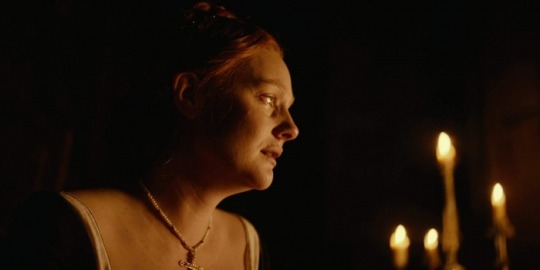
Mary I's Fight For The Throne
16th May 1553 - Mary writes to her brother Edward VI
My duty must humble remembered to your majesty, it may please the same to be advertised that, as the hearing of your highness’s late rheum cough was to me as much grief as ever was any worldly thing, even so the hope which I have conceived since I received your majesty’s last token by my servant has been not a little to my comfort, praying Almighty god our lord according to my most bounden duty to give your majesty perfect health and strength with long continuance in prosperity to reign, beseeching your highness to pardon this my bold and rude writing, and if in the same I do trouble your majesty at this present, as I hope I do not, that than my humble duty and nature which enforced me thereunto, may excuse my default.
Thus most humble taking my leave of your majesty I do and shall daily pray for the prosperous preservation of your most royal estate, as of all others I am most bounden.
From Beaulieu the 16th of May, scribbled with a rude hand.
Your majesty’s most humble sister, Mary 1
Mary writes the above letter to her brother after hearing he has recovered from his long illness. On the 12th May, Imperial ambassador Jehan Scheyfve wrote "A rumour was spread recently that the King was on the way to recovery and his illness was decreasing, to appease the people who were disturbed" 2; this could have been referring to a panicked Mary, who in her letter here describes how she was in "as much grief as ever was any worldly thing." 3
Though Edward was ill, there is evidence that he did in fact rally for a brief while. In a letter to William Cecil dated the 7th May, the Duke of Northumberland wrote "our physicians hath, this last two or three mornings, revived my spirits withal, which is that our sovereign lord doth begin, very joyfully, to increase and amend, they having no doubt of the thorough recovery of His Highness." 4 The physicians were newly appointed, with one of them being the Duke's own. 5
Northumberland remains friendly with Mary, continuing to send her news of Edward, and offering "his good offices [...] on several occasions." 6 This is proven true by the Privy Council's response to her stolen hawks, ordering interrogators the Earl of Sussex and Sir Richard Southwell, that to "the end that the said hawks be restored to the Lady Mary's grace, if they [criminals] refuse to [confess] by gentleness, then we desire your lordship to force them to do the same by straight handling and punishment." 7
Northumberland may have been trying to convince Mary to return to court, to sort the problem in person and visit her brother again, as the Imperial ambassador believed that "those in power are making attempts to induce the Lady Mary to come to Court to visit the King." 8
Meanwhile...
After arriving at Greenwich, King Edward "has only shown himself once, in the gardens, the day after his arrival." 9
On 10th May the new French ambassador, Antoine de Noailles, visits the King, though "The ceremony was so lightly gone through [...] that they did no more than go in and come out." 10
Sources
1. Spanish State Papers, 16th May 1553
2. Spanish State Papers, 12th May 1553
3. Spanish State Papers, 16th May 1553
4. Letters and Memorials of State in the Reigns of Queen Mary, Queen Elizabeth, King James, King Charles the First, Part of the Reign of King Charles the Second, and Oliver's Usurpation
5. Spanish State Papers, 5th May 1553
6. Spanish State Papers, 20th May 1553
7. Original Letters illustrative of English History, Vol. 3
8. Spanish State Papers, 12th May 1553
9. Spanish State Papers, 28th April 1553
10. Spanish State Papers, 12th May 1553
8 notes
·
View notes
Text
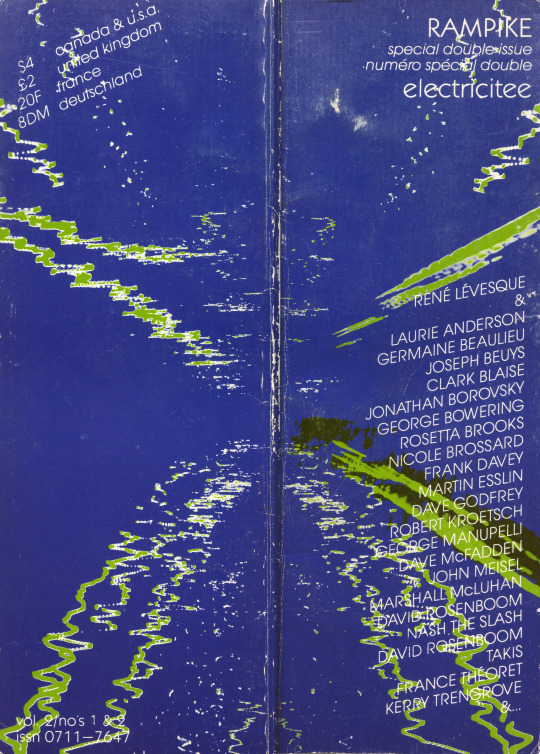
«Rampike», Vol. 2, Nos. 1 & 2, Special Double Issue: 'Electricitee', Edited by Karl Jirgens, Toronto, 1982 [UWindsor Institutional Repository, University of Windsor, Windsor. room 3o2 books, Ottawa]
Contributions by René Lévesque, Marshall McLuhan, John Meisel, Martin Esslin, Joseph Beuys, France Théoret, Dave Godfrey, Kerry Trengrove, Takis, David Rosenboom, Nicole Brossard, Louis Dudek, Frank Davey, Ziggy Blaseje, David Hylnsky, Jonathan Borovsky, Barbara Astman, Holuska, bpNichol, Germaine Beaulieu, Presence Panchounette, Dennis Masi, Karl Jirgens, Laurie Anderson, Dave McFadden, Jean Paul Curtay, Michel Gay, George Bowering, bill bissett, Robert Kroetsch, Clark Blaise, Piotr Kowalski, Peter Gnass, William Furlong, Rosetta Brooks, Nash the Slash, Richard Strange, Andrew Patterson, Chris Devonshire, Jim Montgomery, Martin Bartlett, Al Mattes, Allan Erdmann, Richard Hill, George Manupelli, Art et Industrie, Alexis Wallrich, Claudette Abrams, Sheree Lee Olson, John Grube, Tom McNeeley, Gerry Shikatani, Don Thompson, Tom Dalton, Steve Smith, Robert Priest, Ken Norris, Shaunt Basmajian, Bill Culbert, John Roberts, Rodney Werden, Noel Harding, Terry McCubbin, Endre Farkas
Cover Art by Ints Plampe
#graphic design#typography#art#poetry#magazine#cover#magazine cover#rampike#karl jirgens#ints plampe#uwindsor institutional repository#room 3o2 books#1980s
31 notes
·
View notes
Photo

Richard Jay Belzer (August 4, 1944 – February 19, 2023)
Belzer died at his home in Beaulieu-sur-Mer on February 19, 2023, at the age of 78, from complications of unspecified circulatory and respiratory conditions. According to his friend, novelist Bill Scheft, his last words were "Fuck you, motherfucker".
17 notes
·
View notes
Text
Perkin Warbeck besieging Exeter (september 17th, 1497).

Perkin Warbeck attempted to besiege Exeter with Cornish rebels numbering 3,000 to 6,000 men in what is probably the last military operation of the War of the Roses. Against him stand the mayor and municipal authorities with his (alleged) brother-in-law Edward Courtenay, Earl of Devon.
As Perkin Warbeck claimed to be Richard of Shrewsbury, second son of Henry VII, he might have wanted the city as a stronghold, a source of plunder, or a harbor making it easier to escape.
Unfortunately for him, the city and the Earl refused to either surrender or join him. Violent and repeated assaults on the East and northern gate. Without artillery, Perkin's supporters attempted to burn the gate and succeeded. The defenders chose to nourish the fire to block the entry!
Facing the imminent arrival of a royal force, Perkin Warbeck chose to stop attempts to take the city and to move north. At Taunton, he deserted his army at the prospect of facing lord Daubeney's royal army (which was bigger and more equipped). In a letter to the king, Devon wrote that the siege claimed the life or 300 to 400 rebels.
Perkin Warbeck would be captured at Beaulieu Abbey and executed two years later.
#Perkin Warbeck#Henry VII#Edward Courtenay#Earl of Devon#Exeter#I wonder if one could count Perkin Warbeck as part of the War of the Roses#if so this is the last confrontation#1497 could be the end
12 notes
·
View notes
Text

"NOUVELLES GARDES-MALADES DE NOTRE-DAME," La Presse. May 31, 1933. Page 12.
----
La collation du diplôme de l'école des gardes-malades de l'hôpital Notre-Dame a eu lieu hier soir, sous la présidence de Mgr A.-V.-J. Piette, recteur de l'Université de Montréal. Cette photographie représente le groupe des nouvelles graduées prise avant le banquet qui inaugurait la cérémonie. Assises, de ganche à droite: Miles Emilienne Porte- lance, Blanche Pronoveau, Hermance Lacasse, Carmelle Lamoureux, Aurore Dupont, Cécile Perreault, Berthe Marleau, Marie-Ange Riopel, Rita Joubarne, Marguerite Rivel, Colombe Guevremont, Marie-Ange Paradis, Simone Mayotte et Denise Ledue. Debout en arrière: Miles Germaine Leduc, Lucile Beaulieu, Adéline Arsenault, Juliette Fraser, Simone Bélair, Laura Richard, Yvette Dion, Simone Saint-Germain, Régina Lalonde, Aline Duval, Estelle Pauze, Pauline Larocque, Alice Talbot, Hélène Talbot, Anna-Maria Chevaller, Rachel Désilets, Juliette Lafontaine, Juliette Jacob. (Cliché La "Presse")
#montreal#gardes-malades#nursing students#nursing school#université de montreal#great depression in canada#women workers#history of canadian healthcare
1 note
·
View note
Text
Blanche as Regent, and the narrative of Louis's minority
There was no real threat or challenge to the status of young Louis as king. He had been designated by his father in his will, and the Capetian line had descended from father to son since 987. But when power was personal, minority government was always contested government. Magnates like Theobald of Champagne and Peter Mauclerc, who had been chafing under the heavy fists of Philip Augustus and Louis VIII, would certainly take advantage of the minority to push claims to additional land and power as far as they could, and protect themselves against what they saw as royal encroachment on their lordships. Others who were fundamentally loyal to the Capetians would still see a minority as an opportunity to bolster their positions. Peter Mauclerc was already exploiting Henry III's desires to regain the Angevin lands as a lever of personal power: he would not let slip the opportunity offered by a minority. All this could be expected.
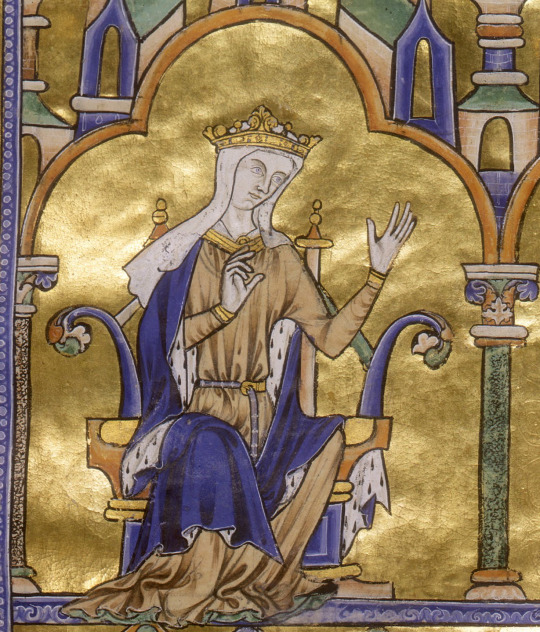
Blanche's status as guardian and custodian of king and kingdom was another matter. There were no established norms for regency, whether in the case of a minority or when the king was out of the country in Crusade. The only previous Capetian to have succeeded as a minor was Philip I in 1060. The realm was ruled during his minority by his uncle by marriage, Count Baldwin of Flanders, probably with some assistance from Philip's mother, Anna of Kiev. Arrangements for Crusading regencies had varied. Philip Augustus had left the country in the guardianship of his mother, Adela of Champagne, her brother, the archbishop of Reims, and six prominent Paris merchants, who supervised the financial accounts. During the Second Crusade, the regents, "elected" under the influence of Bernard of Clairvaux, were an unlikely, and not very successful, triumvirate: Abbot Suger of Saint-Denis, the archbishop of Reims and Louis VII's cousin Ralph of Vermandois. No powers were vested in Louis VII's mother, Queen Adela of Maurienne. The great principalities had a stronger tradition of leaving power in the hands of an absent prince's wife or a minor prince's mother. Recent notable examples were the successive countesses of Champagne, Mary of France and Blanche of Navarre. But leaving the kingdom in the hands of the queen alone was novel. (At least in France, though there was the recent example of Margaret of Navarre in Sicily). At the very least, one might have expected her to hold power jointly with a prominent churchman. The archbishop of Reims was the traditional choice- but William of Joinville had died shortly before Louis, on the return from the Albigensian Crusade.
[..]
There certainly were challenges to the regency from the French baronage. Political songs of the day accused Blanche of sending money to Spain, and accused both Blanche and Walter Cornut of preferring the men of Spain to the barons of France. They accused Blanche of keeping young Louis unmarried so that she could remain in power, and accused her of being the mistress of, variously, Theobald of Champagne and Cardinal Romanus Frangipani. Like most regents, Blanche would have to make concessions and obtain by diplomacy what a king would have obtained by command.
The narrative of Louis's minority produced by all his biographers, Geoffrey of Beaulieu, William of Nangis and Joinville, is a dramatic one, of terrible threat to Blanche's rule, and even to the king himself. All of them were writing long after the events, but all of them knew many of the protagonists, and reported first-hand accounts from Louis himself. The same dramacic story is told by the contemporary chroniclers, the Flemish Philip Mousquès, the English Roger of Wendover and Matthew Paris, and the slightly later Ménestrel of Reims. But there are problems with all these sources. Their chronology of events is unclear and sometimes contradictory. Wendover may have had some information from those who campaigned with Richard Marshall alongside the most fractious of the French barons, Peter Mauclerc; at all events, Wendover's account, while a splendid source of French "baronial" gossip, is not always reliable as to facts. Matthew Paris, reworking Wendover's text, could not resist the baronial gossip, though he often dismissed it as lurid rumour. Of the contemporary French chroniclers, Philip Mousquès was well informed on French court gossip from a Flemish perspective, but his chronology is confused. The Ménestrel of Reims' court gossip was more second-hand, and his main aim was to entertain: his chronology is even more confused. St Louis's biographers tend to collapse together events that happened over a long time span, while Joinville, as seneschal of Champagne, was particularly concerned with events in and affecting that county. For all these sources, the narrative of the valiant widowed queen protecting her young son against the powerful wicked barons of France was irresistible. Indeed, it is clear from Louis's reminiscences, as reported by his biographers, that it had become the family's own narrative.
But it is a dramatization and an oversimplification. Many French magnates remained loyal. Those who proved particularly fractious had already been so under Louis VIII. The most consistent plotter of all, Peter Mauclerc, count of Brittany, continued his conspiracies long after St Louis had reached his majority; and Theobald of Champagne's major revolt occurred under Louis's personal kingship. Private war remained endemic in France, though Louis tried to outlaw it, to the disgust of his barons, in 1258. Blanche faced a continual need to control marriage alliances that might lead to dangerous power blocs — but that had been true in the previous two reigns, and continued to be an issue after Louis attained his majority. Much of the worst trouble was not aimed at toppling Blanche’s status as guardian of the realm; it was a series of attacks against Theobald of Champagne. The succession to Champagne had long been an issue, as had the border zone berween Champagne and Burgundy. Blanche and Louis intervened, for the king (or his regent) should ensure peace within his realm, and they did so with reasonable success. The exact chronology of the troubles is difficult to establish, but it seems that, after a difficult few months, stability had been restored by March 1227. In summer 1229 came the major attack on Champagne by members of the Burgundian aristocracy together with various related allies — though the fact that their relations included Peter of Brittany gave it a dangerous edge, for Peter was also plotting an invasion from England with Henry III. By summer 1230 it was clear that had failed, and although Peter of Brittany made war in western Normandy and the western Loire in most subsequent campaigning seasons until 1236, he was increasingly isolated. After 1230 he was an irritant rather than a threat to the Capetian kingship.
Joinville makes much of Blanche being a foreigner, from Spain, "who had neither relatives nor friends in all the kingdom of France". This was untrue. She had both friends and relatives on whom she could depend. The friendship and patronage networks that she had developed since her arrival in France, as the Lady Blanche and as queen consort, now supported her. The administrators, both lay and eccsiastical, who had worked so closely with her husband, and who were in many cases inherited from Philip Augustus, notably Bishop Guérin of Senlis (until his death in April 1227), Walter Cornut, archbishop of Sens, and his relations, the Clément family, Bartholomew of Roye, the chamberlain, and Matthew of Montmorency, the constable, proved intensely loyal. It was in their interests to support the Capetian crown, from which they derived their power and prestige. They might have been slightly cool in support of a queen regent, but they were not. Like her husband, Blanche could rely on the support of the aristocracy of the north-east, where her dower lands lay, such as Michael of Harnes, Arnold of Audenarde and John of Nesle, and on some of the most important reformist churchmen, notably the Cistercian bishop Walter of Chartres. She made the loyal, and partly Spanish, Theobald of Blaison seneschal of the politically sensitive Poitou. The important Angevin families of Craon and Des Roches supported the Capetians, as did the rich city of La Rochelle. Many of the great barons, too, were faithful, notably Stephen of Sancerre, John of Nesle, Amaury of Montfort and the counts of Blois and Chartres. The last two held their counties through their wives, the sister countesses Margaret of Blois and Isabella of Chartres, who were members of the Capetian family and cousins of Blanche herself.
Lindy Grant- Blanche of Castile, Queen of France
#xiii#lindy grant#blanche of castile queen of france#blanche de castille#queens of france#louis ix#regents#thibault iv de champagne#pierre mauclerc#philippe ii#louis viii#frère guérin#mathieu ii de montmorency#and many more#regencies and troubles
6 notes
·
View notes
Text

"Passion Patrimoine : Les Anges Gardiens du Patrimoine" documentaire présenté par Carole Gaessler de la série "Des Racines et des Ailes" avec les interventions de Delphine Christophe - Directrice de la Conservation du Centre des Monuments Nationaux - Elsa Ricaud - Architecte du Patrimoine - François-Xavier Richard - un des derniers artisans à maîtriser l'impression de papiers peints à la planche en France - ou encore Stéphane Sésé - Propriétaire - au service de la maison arabisante de l'écrivain voyageur Pierre Loti à Rochefort, la maison de vacances de Marcel Proust chez sa tante Léonie à Illiers-Combray, le château de Chevigny-en-Valière ayant appartenu à Beaunois Louis Brossard près de Beaune ou encore l'abbaye cistercienne de Beaulieu-en-Rouergue ayant appartenu à Pierre Brache et Geneviève Bonnefoi, transformée en musée d'art moderne, octobre 2023.
#films#hommage#demeures#Gaessler#Christophe#Ricaud#LAtelierDOffard#Richard#Sese#Loti#Proust#Brossard#Brache#Bonnefoi
1 note
·
View note
Text
Apartment Guide Lewiston - Auburn, Maine (207)
ApartmentGuide, com
[email protected]
[email protected]
[email protected]
http://www.presmgmt.com
Richard Potvin Realty – 207 784-1355
www,sacofallsmanagement.com
Toussaint Property Management 207 782-2972 or CCS2, 207 777-0099
Mathew Gary 207 740-0040 *No Pets
River Valley Apt. 207 784-8991
Preservation Management 207 784-0446
Mr. Beaulieu 207 5766842
H & S…
View On WordPress
0 notes
Text
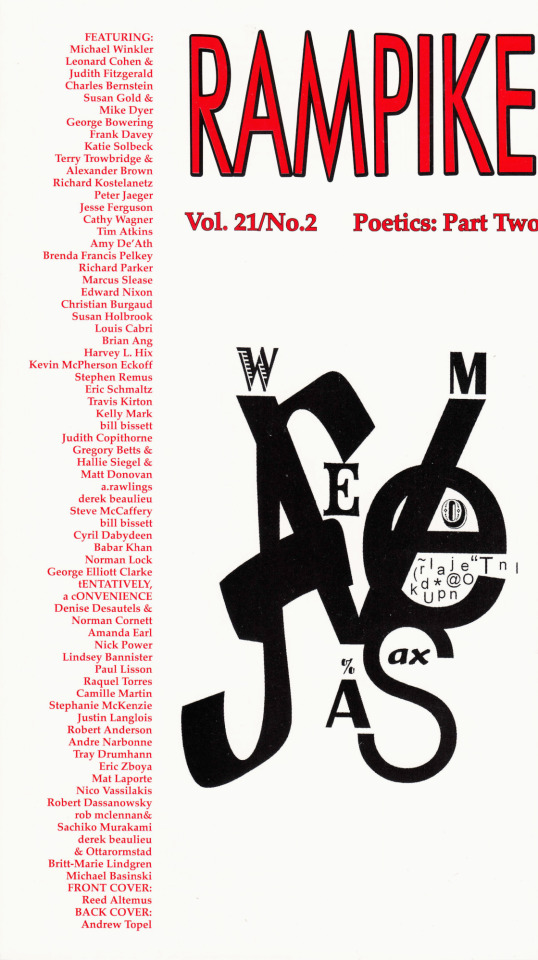
«Rampike», Vol. 21, No. 2, 'Poetics – Part Two', Edited by Karl Jirgens, Windsor, 2012 [UWindsor Institutional Repository, University of Windsor, Windsor. room 3o2 books, Ottawa]

Contributions by Michael Winkler, Leonard Cohen & Judith Fitzgerald, Charles Bernstein, Susan Gold & Mike Dyer, George Bowering, Frank Davey, Katie Solbeck, Terry Trowbridge & Alexander Brown, Richard Kostelanetz, Peter Jaeger, Jesse Ferguson, Cathy Wagner, Tim Atkins, Amy De'Ath, Brenda Francis Pelkey, Richard Parker, Marcus Slease, Edward Nixon, Christian Burgaud, Susan Holbrook, Louis Cabri, Brian Ang, Harvey L. Hix, Kevin McPherson Eckoff, Stephen Remus, Eric Schmaltz, Travis Kirton, Kelly Mark, bill bissett, Judith Copithorne, Gregory Betts, Hallie Siegel, Matt Donovan, a.rawlings, derek beaulieu, Steve McCaffery, bill bissett, Cyril Dabydeen, Babar Khan, Norman Lock, George Elliott Clarke, tENTATIVELY a cONVENIENCE, Denise Desautels & Norman Cornett, Amanda Earl, Nick Power, Lindsey Bannister, Paul Lisson, Raquel Torres, Camille Martin, Stephanie McKenzie, Justin Langlois, Robert Anderson, Andre Narbonne, Tray Drumhann, Eric Zboya, Mat Laporte, Nico Vassilakis, Robert Dassanowsky, rob mclennan & Sachiko Murakami, derek beaulieu, & Ottarormstad, Britt-Marie Lindgren, Michael Basinski
Front Cover Art: Reed Altemus
Back Cover Art: Andrew Topel
#graphic design#typography#art#poetry#concrete poetry#visual poetry#magazine#cover#magazine cover#rampike#karl jirgens#reed altemus#andrew topel#uwindsor institutional repository#room 3o2 books#2010s
11 notes
·
View notes
Text
How Did Richard Belzer Pass Away? A Look into Cause of Death of 78-Year-Old
Richard Belzer, the stand-up legend and TV actor, passed away on February 19 2023, at the age of 78. Belzer died at his home in Beaulieu-sur-Mer from complications from unspecified respiratory and circulatory conditions.
The news of Belzer’s death was confirmed by his friend Bill Scheft, who has also been working on a documentary about Richard Belzer’s life and career.
How did Richard Belzer…

View On WordPress
0 notes
Text
Actor Richard Belzer, Who Played ‘Law & Order’ Detective, Has Died
Actor, comedian and author Richard Belzer, who was known for portraying a cynical detective on the long-running “Law & Order: Special Victims Unit” TV series, has died, his friends and former publisher said Sunday.
Belzer, 78, died early Sunday “peacefully with family at his side” at his home in Beaulieu-sur-Mer, southeast France, his longtime friend Bill Scheft told HuffPost.
“His last words…

View On WordPress
0 notes
Text
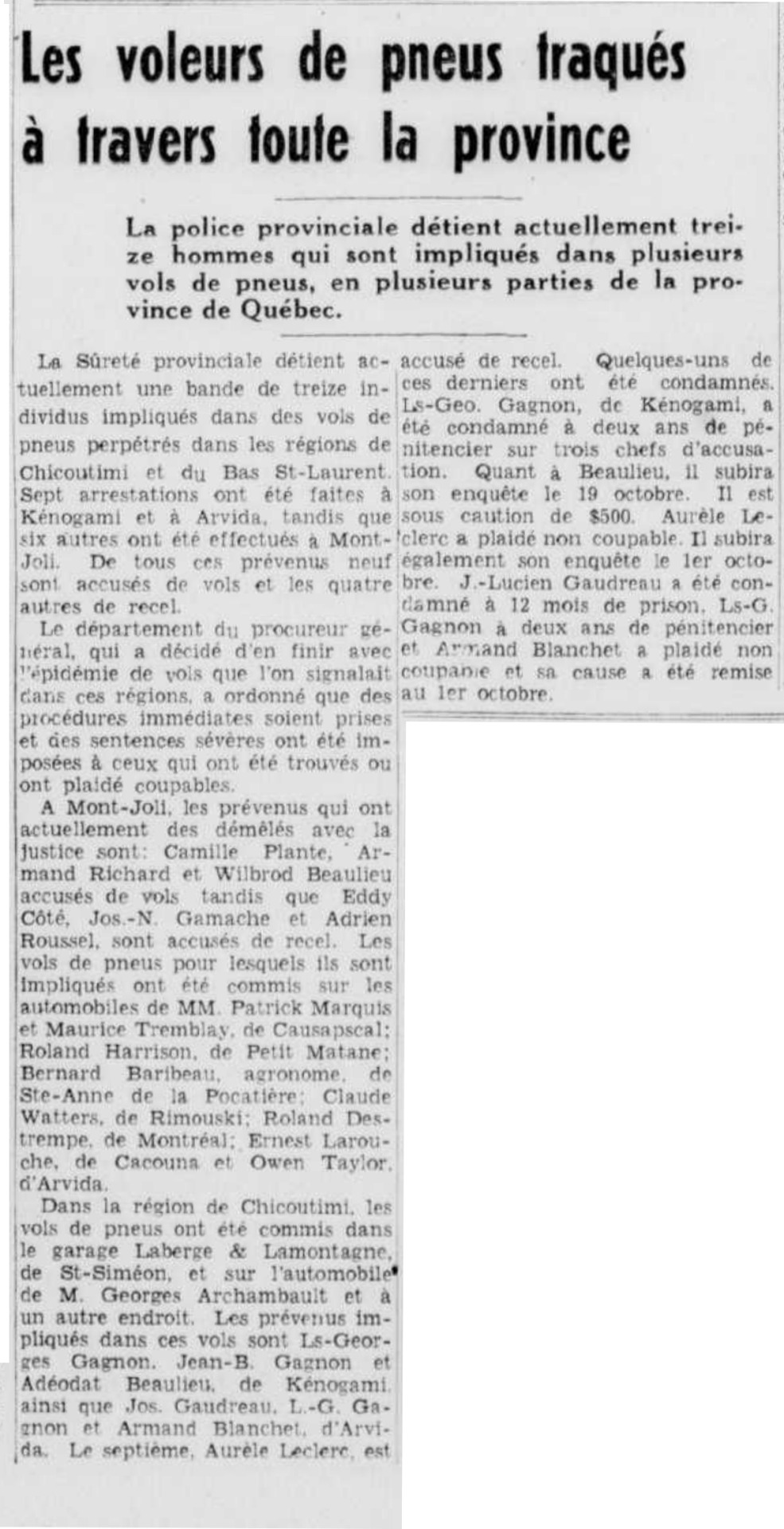
"Les voleurs de pneus traqués à travers toute la province," Le Soleil. September 29, 1942. Page 1.
----
La police provinciale détient actuellement trei-ze hommes qui sont impliqués dans plusieurs vols de pneus, en plusieurs parties de la province de Québec.
----
La Sûreté provinciale détient actuellement une bande de treize individus impliqués dans des vols de pneus perpétrés dans les régions de Chicoutimi et du Bas St-Laurent. Sept arrestations ont été faites à Kénogami et à Arvida, tandis que six autres ont été effectués à Mont-Joli. De tous ces prévenus neuf sont accusés de vols et les quatre autres de recel.
Le département du procureur général, qui a décidé d'en finir avec "épidémie de vols" que l'on signalalt cans ces régions, a ordonné que des procédures immédiates soient prises et des sentences sévères ont été imposées à ceux qui ont été trouvés ou ont plaidé coupables.
A Mont-Joli, les prévenus qui ont actuellement des démélés avec la Justice sont: Camille Plante. Armand Richard et Wilbrod Beaulieu accusés de vols tandis que Eddy Côté, Jos.-N. Gamache et Adrien Roussel, sont accusés de recel. Les vols de pneus pour lesquels ils sont Impliqués ont été commis sur les automobiles de MM. Patrick Marquis et Maurice Tremblay, de Causapscal; Roland Harrison, de Petit Matane; Bernard Baribean, agronome, de Ste-Anne de la Pocatière: Claude Watters, de Rimouski: Roland Destrempe, de Montréal; Ernest Larouche, de Cacouns et Owen Taylor, d'Arvida.
Dans la région de Chicoutimi, les vols de pneus ont été commis dans le garage Laberge & Lamontagne de St-Siméon, et sur l'automobile de M. Georges Archambault et à un autre endroit. Les prévenus impliqués dans ces vols sont Georges Gagnon. Jean-B. Gagnon et Adeodat Beaulieu de Kénogami ainsi que Jos. Gaudreau. L-G. Gagnon et Armand Blanchet, d'Arvida. Le septième, Aurèle Leclerc, est accusé de recel. Quelques-uns de ces derniers ont été condamnés. L-Geo. Gagnon, de Kenogami, a été condamné à deux ans de pénitencier sur trois chefs d'accusason enquête le 19 octobre. Il est sous caution de $500. Aurèle Leclerc a plaide non coupable. Il subira egalement son enquête le 1er octobre. J.-Lucien Gaudreau a été condamné à 12 mois de prison. Ls-G. Gagnon à deux ans de pénitencier et Armand Blanchet a plaide non coupane et sa cause a été remise au 1er octobre.
#chicoutimi#mont-joli#arvida#stolen tires#rubber theft#black market#rubber rationing#rubber goods#wartime rationing#selling stolen goods#receiving stolen goods#sentenced to the penitentiary#st vincent de paul penitentiary#la sûreté#sentenced to prison#county jail#canada during world war 2#crime and punishment in canada#history of crime and punishment in canada
0 notes
Text
Richard Belzer, comedian turned iconic TV cop on
Richard Belzer, the comedian and actor best known for his role as Detective John Munch on the “Law & Order” franchise, has died at 78, Bill Scheft, a longtime family friend, confirmed to CBS News on Sunday.
Scheft said Belzer passed away surrounded by family in Beaulieu-sur-Mer, in the south of France.
Mariska Hargitay, left, as Sgt. Olivia Benson, and Richard Belzer as Special Investigator John…

View On WordPress
0 notes